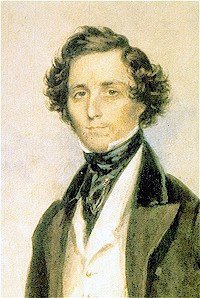Online Encyclopedia
Felix Mendelssohn

Jacob Ludwig Felix Mendelssohn-Bartholdy, always known simply as Felix Mendelssohn (February 3, 1809 - November 4, 1847) was a German composer of the early Romantic period. He was perhaps the greatest child prodigy after Mozart.
Mendelssohn was born in Hamburg, the son of a banker, Abraham, who was himself the son of the famous Jewish philosopher, Moses Mendelssohn. Felix's family, however, converted to Christianity, and moved to Berlin in 1812. His sister was Fanny Mendelssohn (later Fanny Hensel), who was a well known pianist and amateur composer herself.
Mendelssohn began taking piano lessons from his mother when he was six, and at seven was tutored by Marie Bigot in Paris. From 1817 he studied composition with Carl Friedrich Zelter in Berlin. He probably made his first public concert appearance at the age of nine, when he participated in a chamber music concert. He was also a prolific composer as a child, writing his first published work, a piano quartet, by the time he was thirteen. Goethe met the young Mendelssohn and took quite a shine to him, saying to him "When I am sad, come and cheer me with your playing."
Mendelssohn wrote his first symphony at the age of fifteen, and at seventeen he wrote an overture to Shakespeare's A Midsummer Night's Dream, which is probably the earliest well known work by him (he later wrote more incidental music for the play). In 1827 he saw the first production of one of his operas, Die Hochzeit des Camacho, having written several others before then.
In 1830, Mendelssohn wrote the concert overture The Hebrides, otherwise known as Fingal's Cave, a piece which remains popular today. It was inspired by visits he made to Scotland around the end of the 1820s. These visits also inspired his Symphony No. 3, The Scottish Symphony, which was written intermittently between around 1830 and 1842. Mendelssohn travelled widely in Europe throughout his life, and a visit to Italy inspired one of his best known works, the Symphony No. 4, known as the Italian, the final version of which was completed in 1834. In all, Mendelssohn wrote five symphonies. He also wrote two piano concertos and one famous violin concerto which is often seen as an essential piece for young prodigies to play.
As well as orchestral music, Mendelssohn wrote chamber music, including the string octet in 1825, solo piano music, including the Songs Without Words, and two large oratorios, St. Paul in 1836 and Elijah (or Elias) in 1846. These were greatly influenced by Johann Sebastian Bach, whose music he brought to the public's notice, it being relatively obscure at that time. In particular, a performance of Bach's St. Matthew Passion in 1829 under Mendelssohn's direction was a great success. This was the first performance of the work since Bach's death.
In 1842, Mendelssohn wrote incidental music for the Shakespeare play, A Midsummer Night's Dream, including the famous Wedding March that is played as the recessional at many weddings (the other popular piece is the Bridal Chorus from Lohengrin by Richard Wagner, often used as the processional). The use of these two marches, selected by Victoria, The Princess Royal for her marriage to the Crown Prince of Prussia on January 25, 1858, has since become traditional.
Although Mendelssohn is not generally seen as a particularly influential composer, his works were very popular in his own lifetime, and remain so today.
As well reviving interest in Bach, he also kept the work of Franz Schubert before the public. It was he who conducted the premiere of Schubert's Ninth Symphony, more than a decade after the composer's death.
Mendelssohn suffered from bad health in the final years of his life, and it is said he was greatly depressed by the death of his sister Fanny in May 1847. Felix Mendelssohn died on November 4, 1847 in Leipzig.
